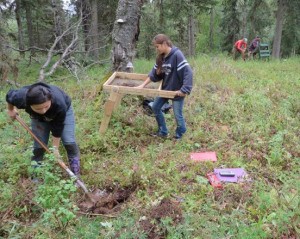Language, Place Names, and Heritage Preservation in Alaska: An Applied Archaeology Field School
- Nov 30, 2019
- 5 min read
August, 2020

Applied Archaeology International is pleased to announce an intensive field school based in Prince William Sound that includes the towns of Valdez and Cordova, Alaska. The 2019 summer program will integrate with workshops and cultural camps with a variety of partners. At the same time, you will participate in archaeological and environmental studies on public and private land, heritage preservation projects, and be part of an international cultural exchange.
Our fieldwork will include expeditions to different parts of Chenega and Eyak Lands to record traditional place names; learn the associated stories, map the surrounding landforms, and survey the cultural values and places related to each location. You will also get involved in a range of outdoor activities that only the wilds of Alaska can provide!
The program integrates with cultural camps and activities, including the annual Eyak Cultural Foundation's language program and culture camp. This involves workshops, cultural exchanges and cultural activities, including traditional salmon harvesting and processing. The program is delivered in partnership with Elders, cultural coordinators, Tribal organizations, camp coordinators, camp hosts, educational institutions and government departments.
The heritage management field school is culturally-guided, project-focused, and action driven. As a participant, you will work directly with Elders, heritage specialists, lawyers and environmental scientists.
What you will learn:
This program will equip you with the skills and knowledge related to college studies and experience working as a professional heritage and environmental officer. The program is open to high-school and college students, those interested in their own professional development, or anyone interested in collaborative heritage and science.
The program takes you step-by-step through a range of skills and experiences while participating in meaningful projects, focused on:
Learning, understanding and following cultural protocols
Language, identity and well-being
Anthropological surveys and cultural mapping
Archaeological surveys, mapping and field skills
Ground Penetrating Radar (GPR) survey
Community and applied archaeology
Heritage laws and methods of survey and evaluation
Place name mapping
Cultural plant surveys and traditional gathering
Cultural science and ecology
Weed control and water testing
Heritage site preservation and environmental management
Rights of nature
Integrating cultural knowledge, archaeology and natural resource management
You will also participate in on-ground heritage protection and management projects.
What you will do:
The project includes work with Elders and cultural coordinators from Chenega. We will carry out project tasks for this community while learning about methods of heritage preservation, the Section 106 process, and fieldwork required to develop a Traditional Cultural District (TCD) nomination. We will also work with technicians and carry out a ground penetrating radar (GPR) survey of the Old Village (devastated by the 1964 Alaska earthquake).

For the second component, this intensive field school will develop a cultural map for Eyak Lake under the direction of cultural leaders. The information will be collected via oral histories, interviews, field survey, archaeological investigations and archival research, as part of an integrated team effort. This work will involve targeted field surveys and site recording focused on Eyak traditional place names. The program can be custom-designed to your specific studies or interests.
There will also be practical workshops in heritage legislation, cultural protocols and methods of evaluation. The work will involve archaeological survey, testing and mapping, and provide you with a collection of skills required of a field archaeologist, anthropologist and environmental scientist. We will also integrate with local community, cultural activities.
From here, the team will workshop how cultural mapping is the basis for developing an integrated heritage management plan. We will workshop current threats and methods for ongoing community-based protection and management at the site and landscape level. We will also participate in workshops with Elders from Australia and New Zealand to learn about ways of cultural monitoring and management, and develop cross-cultural understandings. The program includes formal workshops for understanding the rights of nature - ‘to recognize and protect nature’s inherent rights to exist, thrive and evolve’ (Earth Law Center).

Who is eligible?
The program is open to high school students, college students, and professionals. The program is useful for those studying archaeology, linguistics, anthropology, environmental science, or environmental law - or for those that would like to learn about and experience aspects of these fields. Applied Archaeology is available to assist in contacting your field school sponsor, study abroad officer, or internship provider to organize and plan for the program. We can also assist to arrange high school or college credit for your participation.
*Opportunities for continuing your experience with a similar program in Australia are also available, as part of a larger internship program (see brochure here).*
Schedule
Travel Day 1: Participants are required to meet at the Anchorage, Alaska airport This day will be time for introductions and orientation; including some local sight-seeing and shopping.
Day 2 - 9: From Anchorage, we will drive to the port town of Whittier and take a boat with Elders to Chenega. Here we will be greeted by Elders and set up at the cabins and kitchen. At Chenega we will work with the community to carry out cultural mapping work, GPR surveys, workshops and data analyses, and heritage preservation plans. During this time, we will participate in community life and get involved in outdoor activities in this stunning part of the world.
Days 10-17: Arriving from Chenega we meet the Eyak community (Cordova). The first three days will be spent at camp for orientation, cross-cultural exchange, and learning about the Eyak language and culture program, after which we will take a tour of important cultural places and landscapes, led by Eyak Elders. A series of workshops will lead us into methods of heritage management, legislation, cultural mapping and management plans. As a team we will spend several days in the field to survey, record, map and evaluate the condition and significance of several cultural places and carry out detailed place-name mapping. This session will also introduce you the Eyak language learning program, with specialist linguists, and workshops in how we connect language to community-based heritage preservation and management.
We will also learn about methods of traditional salmon harvesting and processing, and the cultural significance of wild resources. We will participate in a site conservation project that will involve environmental assessment and on-ground restoration, including weed and erosion control. This work will also explore methods of heritage site conservation and monitoring. So this session will involve a mix of field work, workshops and group sessions at camp, focused on developing an integrated cultural map, that includes place name mapping.
After each day, we will process field data as a group. The fieldwork will involve team planning for each expedition to specific place names, using watercraft, drones and skiffs. There will be time allocated to pull all our work together and present site forms, data, maps, and the integrated heritage plan to the Elders - this is a real project and so you participation will be of great value to the community. Coordinators will work with you to link your involvement with your studies and/or professional development.
Travel Day 2: The team travel back to Anchorage, Alaska (via the ferry from Cordova) and you can either fly back home that night or the next day; or continue your travel experience across Alaska.
Here is short video that provides some insight into how the program was established:
The program includes nightly yarns, special guest lectures, sight-seeing, and a range of recreational activity options.

More Information
For information and background please see the article here: Eyak Lake Spit Project
For more information and registration information, please contact:
David Guilfoyle – contact form or email: dg@appliedarchaeologyinternational.com




























































Comments